
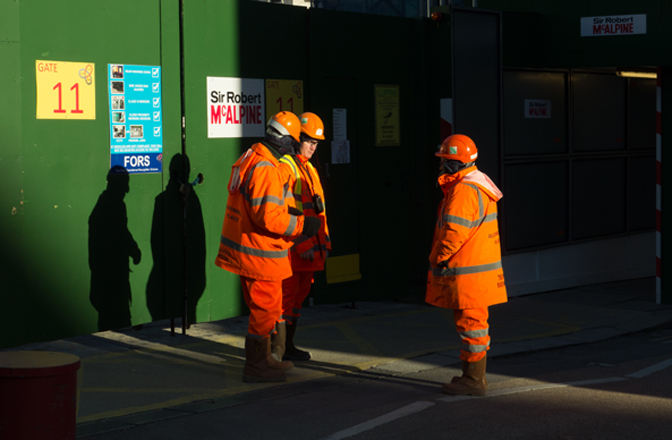
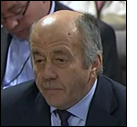 Sir Robert McAlpine director Cullum McAlpine (left) is no innocent. He admitted to MPs in January 2013 his company’s London HQ was the venue for the first and subsequent Consulting Association meetings. He was the founding chair of the construction industry owned and financed covert blacklisting outfit. His firm provided the start-up cash.
Sir Robert McAlpine director Cullum McAlpine (left) is no innocent. He admitted to MPs in January 2013 his company’s London HQ was the venue for the first and subsequent Consulting Association meetings. He was the founding chair of the construction industry owned and financed covert blacklisting outfit. His firm provided the start-up cash.
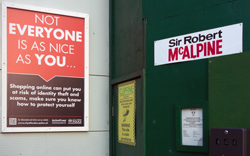
NASTY BUSINESS Sir Robert McAlpine Ltd provided the start up cash for covert blacklister the Consulting Association, and spent hundreds of thousands on illegal name checks.
The association, which held files illegally on thousands of union reps and other safety and environmental campaigners (Hazards 124), was shut down by the Information Commissioner’s Office (ICO) in 2009 and its head, the now deceased private investigator Ian Kerr, was prosecuted. But no action was taken by either ICO or the police against the directors and senior managers that colluded with Kerr, used the lists and bankrolled the operation.
It was an oversight that rankled those who lost their livelihood in what was a boardroom sanctioned attack on workers who stood up for safety. Some lost everything – homes, relationships, even their lives.
Those behind the criminal operation seemed above the law. It was an oversight the Blacklist Support Group (BSG) wanted to right.
Search for justice

MCALPINE’S REFUSELIERS Neither Cullum McAlpine nor senior managers of top blacklister Sir Robert McAlpine Ltd would step up to accept a Blacklist Support Group arrest warrant naming the company director.
On Friday 21 February 2014 - the fifth anniversary of a raid on the Consulting Association by ICO - a small group of men and women who had suffered hardship thanks to the blacklist arrived at Sir Robert McAlpine Ltd's London offices. BSG members combed the corridors of the company HQ in an attempt to serve a Citizen’s Arrest Warrant on Cullum McAlpine, citing criminal safety, human rights and data protection offences.
“During the building of the London Olympics Stadium in 2008 and 2009, Sir Robert McAlpine paid in excess of £28,000 to the Consulting Association for blacklisting name checks – which equates to 65 name checks a day, seven days a week for the period,” BSG founder Dave Smith told clearly unnerved McAlpine staff. They claimed their director was not in the building. Despite repeated requests, no senior figure from the company emerged to meet with the activists.
The blacklist campaigners point out that no director or senior manager has faced charges. Over the same period, phone hacking of celebrities has led to a series of prosecutions. BSG points out that while the celebrity victims of phone hacking certainly suffered a breach of privacy, blacklisted workers endured this and were denied work as a result. The consequences of the blacklist were usually devastating and sometime fatal, they say.
A fleet of police vans turned up at the Sir Robert McAlpine’s Ltd offices near Hyde Park Corner, curtailing the arrest attempt.
Dangerous loopholes
Sir Robert McAlpine and other major construction firms - Skanska, Costain, Laing O’Rourke, Kier, Vinci, Carillion and Balfour Beatty - are joint defendants in a High Court blacklisting conspiracy case. The next hearing in the case, brought by blacklisted workers and the unions Unite and UCATT, was scheduled for April 2014 but has been postponed until later in the year.
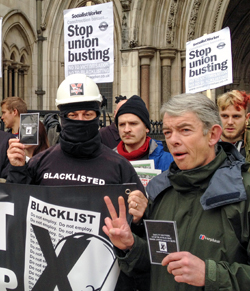
NO HIDING PLACE Blacklisted workers struggled to find work for years. They are now pursuing the guilty companies all the way from their corporate headquarters to the courts.
The ongoing case comes after BSG’s Dave Smith, a former UCATT safety rep who was repeatedly dismissed and refused work after his name appeared on the blacklist (Hazards 107), exposed the inequities of the law at the High Court.
The Employment Appeal Tribunal (EAT) upheld an earlier ruling that said because he was an agency worker and not directly employed by Carillion, employment law did not apply. But in her 17 January 2014 ruling, High Court judge Mrs Justice Slade DBE identified human rights violations and expressed concern that Smith had “suffered an injustice from blacklisting.”
Mowlem, the construction firm taken over by Carillion that ran some of the sites where Smith was victimised was, like Sir Robert McAlpine, a contributor to the Consulting Association.
Smith said he plans to appeal. “Being a union member is not against the law. Raising concerns about asbestos is not against the law. But despite mountains of documentary evidence proving that construction firms were systematically blacklisting union members who questioned safety standards, it seems that big business are above the law,” he said.
“Blacklisting is a violation of human rights. We intend to fight this all the way to Europe until we achieve justice.”
The law fails workers
Smith’s case, and the failure of the authorities to take any action against those running the blue chip construction firms using the blacklist, proves stronger laws are needed, unions have said.
UCATT general Steve Murphy, in evidence to the same January 2013 session of the Scottish Affairs select committee that heard Cullum McAlpine admit the extent of his involvement with the Consulting Association, said “our very best efforts are being hampered by the fundamental weakness of the anti-blacklisting regulations. Until these are strengthened there will be companies willing to blacklist workers.”
He said the existing regulations, where the only resort a blacklisted worker has is to take a case to an employment tribunal, were too weak. The definition of what constituted blacklisting was also too narrow, the union said. Reforms the union wants to see include making blacklisting a criminal offence and automatic compensation for blacklisted workers.
The sustained attention has rattled the companies. In October 2013, Sir Robert McAlpine, Balfour Beatty, Carillion, Costain, Kier, Laing O'Rourke, Skanska UK and Vinci proposed a Construction Workers Compensation Scheme.
The firms did not admit liability, instead apologising “for their involvement with the Consulting Association and the impact that its database may have had on any individual construction worker.”
UNION EFFECT Management-worker joint health and safety committees (JHSC) are only effective where “empowerment mechanisms” ensure workers have a real voice, a study has concluded. more
Many more now know they were due this grudging apology. In December 2013, around 1,200 victims and families were sent letters by ICO telling them they were on the blacklist.
Unite urged recipients of the ICO letter “not to fall for employer attempts to lock them into a compensation scheme” that was not agreed with unions and “could fall far short of what the victims could otherwise get through union representation.”
Instead, Unite said it its members should call the union’s telephone hotline. Unite assistant general secretary Gail Cartmail said: “We urge the victims of blacklisting and their families to use our hotline or contact their union rather than fall for employer attempts to buy them off. Lives were ruined and families were torn apart - victims of blacklisting deserve the best legal support rather than a scheme designed by employers to limit their exposure, rather than properly compensate the victims.”
Blacklisting, meanwhile, has moved onto the bargaining agenda. In December 2013, Unite and GMB signed “a groundbreaking labour agreement” with EDF Energy including “cast iron protections” against blacklisting at the proposed nuclear power station at Hinkley Point C in Somerset.
Unions say it provides for an “open and transparent hiring process along the contract chain” with union involvement in a recruitment audit. But UCATT leader Steve Murphy said that while anti-blacklisting clauses were a step forward, the voluntary agreement was not legally enforceable. He said that to stamp out blacklisting, stronger laws were needed.
And there is still the outstanding matter of justice for those who suffered decades or hardship orchestrated by the boardroom blacklisters.
“Blacklisted workers have lost their houses and our kids were on free school meals while Cullum McAlpine is the Lord of the Manor in his £4.5 million Grade 1 listed mansion in Cold Ashton,” said BSG’s Dave Smith. “In any civilised society, McAlpine and his co-conspirators would be behind bars.”
Safety committees work on union power
Management-worker joint health and safety committees (JHSC) are only effective where “empowerment mechanisms” ensure workers have a real voice, a study has concluded. The review, which considered 31 studies from Canada, the US, Australia and the UK and included input “from various sectors and perspectives including government, employers, and unions”, found union not only improved the effectiveness of committees, they appeared to promote the introduction of legislation that also led to improvements in safety performance.
The paper concluded that committees alone were not enough - effective regulation and enforcement is essential. The report, published in the American Journal of Industrial Medicine, states “unionisation and legislative environment are crucial contextual factors,” adding: “We note, although not explicitly the focus of our realist review, that there seems to be a relationship between unionisation and the existence of legislation, as well as other features conducive to health and safety.”
The study concluded joint health and safety committees were not a substitute for effective regulation, noting the “only strong conclusion that can be made is that JHSCs cannot take the place of regulation and government enforcement due to the nature of power relations in the workplace.”
A slew of other research has reached similar conclusions on this union effect (Hazards 115). A study of manual workers from Swansea University’s School of Business and Economics published in 2008 confirmed that workers in unionised workplaces were less likely to have a fatal injury.
And a 2000 study from Cambridge University’s Judge Institute of Management Studies concluded the union protective effect extends to ill-health.
Yassi A, Lockhart K, Sykes M, Buck B, Stime B, and Spiegel JM. Effectiveness of joint health and safety committees: A realist review, American Journal of Industrial Medicine, volume 56, number 4, pages 424-438, 2013.
Union rep sacked while at the docs
Unite is taking legal action over the “grotesque” treatment of a prominent Ineos union rep fired “on trumped up charges” while he visited his doctor. Mark Lyon, who Unite say is suffering from a serious stress-related illness as a result of his treatment by the company, was dismissed on 4 February after Ineos said he had not stopped the union from commenting over fears of job losses at the Scottish petrochemical plant.
Unite believes the sacked Ineos convenor’s stress-related illness is related to his treatment by management. It is appealing the decision and pursuing an employment tribunal claim for unfair dismissal and victimisation for trade union reasons on behalf of the 25-year Ineos veteran, who is also vice-chair of the union’s national executive. He has been a prominent union advocate for improved safety at the Grangemouth plant.
Pat Rafferty, Unite’s Scottish secretary, said: “Mark Lyon has been subjected to a grotesque mockery of the disciplinary system which saw him tried in his absence. While he attended a doctor’s appointment, his employer was sacking him on trumped up charges.”
Life gets easier for deadly gangmasters
A decade on from the tragedy at Morecambe Bay which saw 23 Chinese workers lose their lives, vulnerable workers are still at risk of abuse, injury and even death at work, unions have warned. On the evening of 5 February 2004, 23 untrained and inexperienced men and women were drowned by an incoming tide off the Lancashire and Cumbrian coast as they collected cockles.
In the wake of the tragedy the Gangmasters Licensing Authority (GLA) was established, and since 2006 has worked to prevent exploitation of vulnerable, mostly migrant, workers. Since October 2013, however, the GLA has been stripped of responsibility for regulating the forestry sector, land agents or cleaning contractors operating in the food processing industry.
The GLA no longer automatically inspects businesses when they first apply for a licence. Its own research suggests that as many as one in ten rogue gangmasters could be slipping through the net.
The TUC believes instead of reducing the scope of the GLA, its remit should be extended to other high risk sectors including construction, hospitality and social care. TUC general secretary Frances O’Grady said: “Instead of reducing the GLA’s ability to protect workers, the biggest testament the government could pay to what happened at Morecambe Bay would be to extend the reach of the GLA so that rogue employers know that there is no hiding place for those who break the law.”
Unite said undetected abuses by gangmasters were the equivalent of ‘modern day slavery’. It said the fact that only seven gangmasters were convicted for operating without a licence in 2013 proved there must be more GLA investigations and that prosecutors should get tough with the rogues.
Hazards website: www.hazards.org/victimisation
WE WILL GET YOU
Top bosses were caught red handed dealing illegally with a covert blacklister, but none have so far faced justice. So, the Blacklist Support Group went to arrest industry giant and blacklisting ringleader Cullum McAlpine.
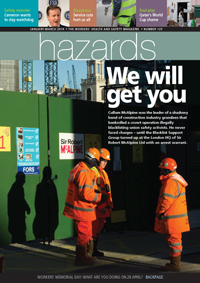
CONTENTS
| • | Introduction |
| • | Search for justice |
| • | Dangerous loopholes |
| • | The law fails workers |
Hazards webpages
Victimisation
Deadly business
A new Families Against Blacklisting Group supports the partners and children of blacklisted workers.
Hazards blacklist blog.
Blacklist Support Group.
RELATED STORIES
| • | Safety committees work on union power |
| • | Union rep sacked while at the docs |
| • | Life gets easier for deadly gangmasters |